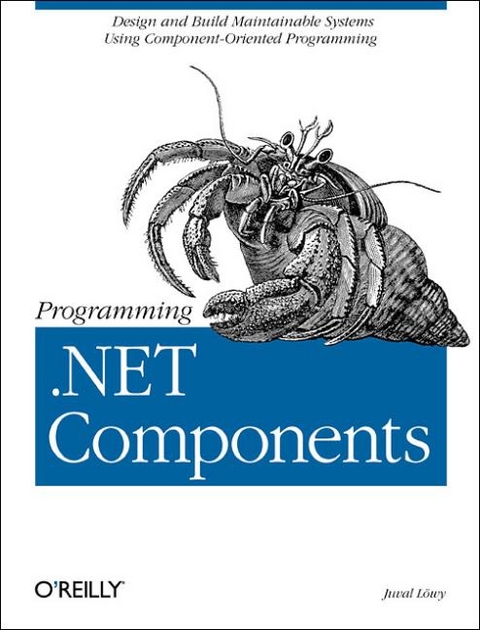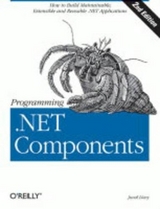
Programming .NET Components
O'Reilly Media (Verlag)
978-0-596-00347-0 (ISBN)
- Titel ist leider vergriffen;
keine Neuauflage - Artikel merken
The introduction of the Microsoft .NET framework not only brings developers a powerful toolset for the development of new Windows and Web applications - it also replaces COM as the technology of choice for building components on Windows platforms. Components are the fundamental building blocks of .NET applications; they can both simplify and add flexibility to complex applications. Applied properly, component-oriented programming enable reuse, allow for long-term maintenance, application extensibility and scalability. Component technology is nothing new, but the .NET Framework offers developers a new way to develop binary components rapidly, without the hurdles that many COM developers have had to deal with prior to .NET. While retaining all of the core concepts that define component-oriented development - language independence, separation of interface from implementation, binary compatibility, versioning, concurrency management, location transparency, security, deployment - .NET is built upon a fresh component-oriented runtime that has an easier time providing these core concepts. "Programming .NET Components offers a complete introduction to the new Microsoft .N
ET component model, focusing on the aspects of .NET that make it ideal for building reusable, maintainable, and robust components. Author Juval Lowy teaches the intricacies of .NET component programming and the related system issues to application developers, along with relevant design guidelines, tips, best practices, and known pitfalls. The book is packed with helpful original utilities aimed at simplifying the programming model and increasing the developer productivity. The book begins with an appreciation for the "why" and fundamentals of component-oriented programming, and then continues with an introduction to .NET essentials. Following practical, expert advice on effective .NET development techniques, the book then devotes a chapter to each of the following features critical to component development: resource management; versioning; events; asynchronous calls; multithreading; serialization; remoting; component services; and security.
Juval Lowy is a seasoned software architect and the principal of IDesign, a consulting and training company focused on .NET design and .NET migration. A Microsoft Regional Director for the Silicon Valley, he works with Microsoft on helping the industry adopt .NET. Juval participates in the Microsoft internal design reviews for future versions of .NET. He also helped found Bay.NET - the California Bay Area .NET User Group and he chairs its program committee. Juval is a frequent speaker at the major international software development conferences, where he talks about .NET, component-oriented design, and development process. Juval published numerous articles, regarding almost every aspect of .NET development. He is a contributing editor to the Visual Studio Magazine and a regular columnist to the CoDe Magazine. He has also written for MSDN magazine. Microsoft recognized Juval as a Software Legend as one of the world top .NET experts and industry leaders.
Preface 1. Introducing Component-Oriented Programming Basic Terminology Component-Oriented Versus Object-Oriented Programming Principles of Component-Oriented Programming .NET Adherence to Component Principles Developing .NET Components 2. .NET Component-Oriented Programming Essentials Language Independence: The CLR Packaging and Deployment: Assemblies Binary Compatibility 3. Interface-Based Programming Separating Interface from Implementation Working with Interfaces Designing and Factoring Interfaces 4. Lifecycle Management The Managed Heap Object Finalization Deterministic Finalization 5. Version Control Assembly Version Number Assembly Deployment Models Understanding Strong Names and Shared Assemblies Custom Version Policy CLR Versioning 6. Events Delegate-Based Events Working with .NET Events 7. Asynchronous Calls Requirements for an Asynchronous Mechanism Revisiting Delegates Asynchronous Call Programming Models Asynchronous Error Handling Asynchronous Events Asynchronous Invocation Pitfalls Synchronous Versus Asynchronous Components 8. Multithreading and Concurrency Management Threads and Multithreading Components and Threads Working with Threads Synchronizing Threads Automatic Synchronization Manual Synchronization Using .NET Multithreading Services 9. Serialization and Persistence Automatic Serialization Custom Serialization Serialization and Class Hierarchies 10. Remoting Application Domains Remote Object Types Marshaling by Reference Activation Modes .NET Remoting Architecture Building a Distributed Application Leasing and Sponsorship .NET and Location Transparency 11. Context and Interception .NET Component Services The .NET Context Custom Component Services 12. Security .NET Security Architecture Configuring Permissions Programmatic Security Principal-Based Security Addressing Other Security Vulnerabilities A. Interface-Based Web Services B. Custom Security Principal C. Reflection and Attributes Index
| Erscheint lt. Verlag | 20.5.2003 |
|---|---|
| Zusatzinfo | index |
| Verlagsort | Sebastopol |
| Sprache | englisch |
| Maße | 180 x 233 mm |
| Gewicht | 762 g |
| Einbandart | kartoniert |
| Themenwelt | Informatik ► Betriebssysteme / Server ► Windows |
| ISBN-10 | 0-596-00347-1 / 0596003471 |
| ISBN-13 | 978-0-596-00347-0 / 9780596003470 |
| Zustand | Neuware |
| Haben Sie eine Frage zum Produkt? |
aus dem Bereich



